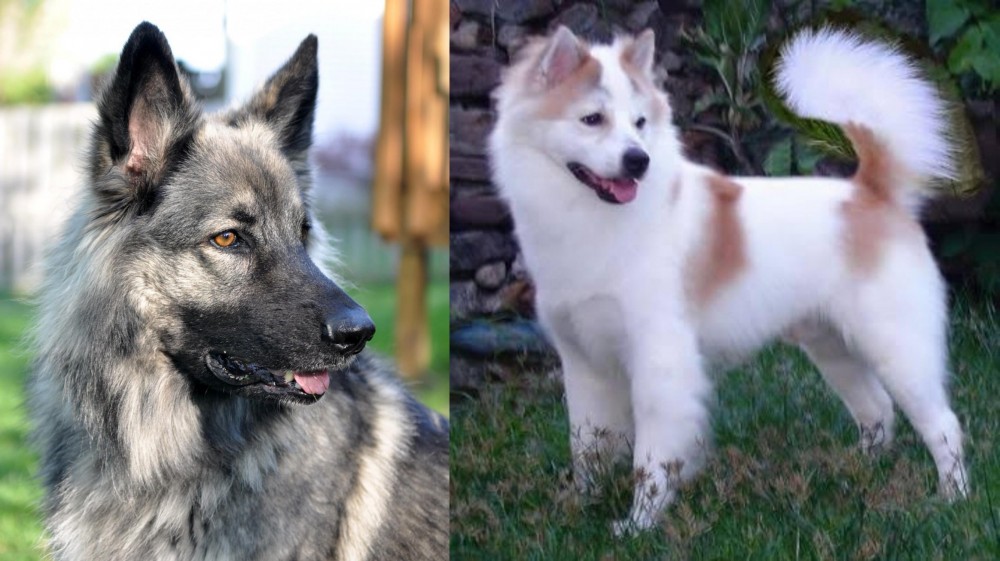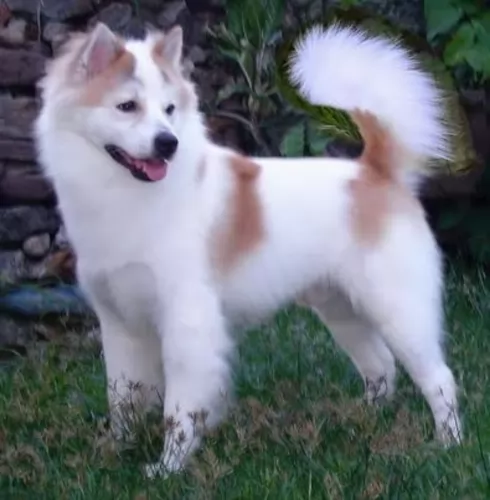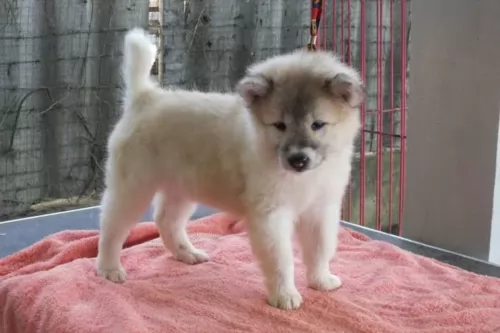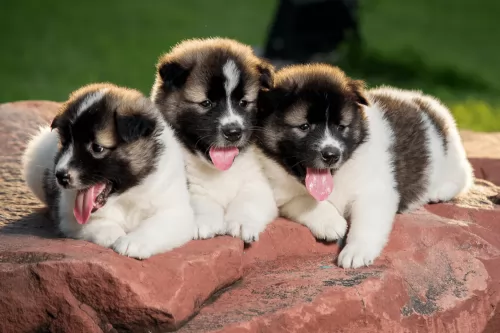 Petzlover
Petzlover Shiloh Shepherd is originated from United States but Thai Bangkaew is originated from Thailand. Shiloh Shepherd may grow 23 cm / 9 inches shorter than Thai Bangkaew. Shiloh Shepherd may weigh 39 kg / 86 pounds more than Thai Bangkaew. Both Shiloh Shepherd and Thai Bangkaew has same life span. Shiloh Shepherd may have more litter size than Thai Bangkaew. Shiloh Shepherd requires High Maintenance. But Thai Bangkaew requires Moderate Maintenance
Shiloh Shepherd is originated from United States but Thai Bangkaew is originated from Thailand. Shiloh Shepherd may grow 23 cm / 9 inches shorter than Thai Bangkaew. Shiloh Shepherd may weigh 39 kg / 86 pounds more than Thai Bangkaew. Both Shiloh Shepherd and Thai Bangkaew has same life span. Shiloh Shepherd may have more litter size than Thai Bangkaew. Shiloh Shepherd requires High Maintenance. But Thai Bangkaew requires Moderate Maintenance
 The Shiloh Shepherd is currently a hybrid that breeders are attempting to develop into a new breed. New York breeder, Tina Barber, out of Shiloh Shepherds kennel developed dogs when in 1974, she attempted to develop a German Shepherd line. She wanted a GSD that was more like the ones she remembered from her childhood.
The Shiloh Shepherd is currently a hybrid that breeders are attempting to develop into a new breed. New York breeder, Tina Barber, out of Shiloh Shepherds kennel developed dogs when in 1974, she attempted to develop a German Shepherd line. She wanted a GSD that was more like the ones she remembered from her childhood.
Tina took her foundation stock out of the AKC and got the FIC (Federation of International Canines) to recognize the Shiloh Shepherd as a separate breed. The FIC is not the same as the FCI or Federation Cynoloquque Internationale. In 1991 the Shiloh Shepherd Dog Club of America was formed, and the shepherd was recognized by the American Rare Breed Association.
Official recordkeeping on the breed began in 1993. The computer system TCCP maintains breed records and the Shiloh Shepherd has at least 9 generations in the system. Tina Barber was president of the Shiloh Shepherd Dog Club of America and oversaw the international club as well. She was responsible for the breed. After her death in 2011, her daughter took her place in working with the breed.
The Shiloh and the German Shepherd were then crossed to develop the King Shepherd.
 The Thai Bangkaew breed comes from a small village in the Bang Rakarn District of the Phitsanulok Province, in Thailand. The breed is named after that village of Bangkaew. A wild dog was crossed with a Buddhist abbot’s black and white female. Today’s Bangkew is the direct result of breeding only from the litters produced from these original two. Some believe the wild dog was a jackal that is now extinct. The breed is similar to a Spitz and is a good hunter and an intelligent family member. However they still maintain some of the wildness of the jackal.
The Thai Bangkaew breed comes from a small village in the Bang Rakarn District of the Phitsanulok Province, in Thailand. The breed is named after that village of Bangkaew. A wild dog was crossed with a Buddhist abbot’s black and white female. Today’s Bangkew is the direct result of breeding only from the litters produced from these original two. Some believe the wild dog was a jackal that is now extinct. The breed is similar to a Spitz and is a good hunter and an intelligent family member. However they still maintain some of the wildness of the jackal.
The Thai Bangkaew was developed to be a guard dog and alert their owners of any strangers or dangers. By 1957 the dog we know today we being developed through selective breeding. They are not recognized today by the AKC. These facts have made it a very rare breed that is hard to find outside southeast Asia. They are great outdoor companions.
 Shiloh Shepherds are giant dogs, much larger than the usual German Shepherd Dog. The Shiloh had been bred to be a companion animal and not a guardian or herder. The Shiloh looks more like a wolf than either the German or the King Shepherd Dog. Their back is straighter than the GSD and they are larger, more stable and more intelligent. They were bred to show a complimentary balance between strength and elegance.
Shiloh Shepherds are giant dogs, much larger than the usual German Shepherd Dog. The Shiloh had been bred to be a companion animal and not a guardian or herder. The Shiloh looks more like a wolf than either the German or the King Shepherd Dog. Their back is straighter than the GSD and they are larger, more stable and more intelligent. They were bred to show a complimentary balance between strength and elegance.
They have slightly domed, broad heads with a muzzle that gradually tapers, strong cheekbones and black lips. Their ears are triangles, well cupped and firm. The Shiloh Shepherds eyes are either brown or very dark. They have a straight back which is muscular and broad. Their chests deep and their tails plush, long and curved.
They have a very “heavy” appearance compared with other shepherds. They are well muscled in both the lower and upper thighs. Their coat is plush, and they have a dense undercoat. Their hair is harsh to the touch. There is both a smooth coat and a plush coat with the plush coat being more prevalent.
 A compact and square dog, the Thai Bangkaew is a well proportioned breed with a gait that is smooth. They have a deep, wide chest with muscular and strong neck. The head is also square, the ears pointed and the eyes brown and average size. They have a double coat and a longer, thicker ruff. Their chest and back also have a ruff like a lion. The tail is plumed and carried up high and curves over the dog’s back. Their coat is water-repellent.
A compact and square dog, the Thai Bangkaew is a well proportioned breed with a gait that is smooth. They have a deep, wide chest with muscular and strong neck. The head is also square, the ears pointed and the eyes brown and average size. They have a double coat and a longer, thicker ruff. Their chest and back also have a ruff like a lion. The tail is plumed and carried up high and curves over the dog’s back. Their coat is water-repellent.
 The Shiloh Shepherd has some health issues to deal with. These include: They seem to have very sensitive stomachs and intestinal issues.
The Shiloh Shepherd has some health issues to deal with. These include: They seem to have very sensitive stomachs and intestinal issues.
• Bloat – gastric dilatca ation volvulus – twisted stomach or intestines. Needs immediate veterinary care.
• Small intestine bacterial overgrowth – diarrhea, difficulty absorbing nutrients, abdominal pain.
 This is a very healthy breed with a relatively clean genentic pool. The dogs tend to be healthy. They have no congenital health issues. However they do contract some normal canine issues.
This is a very healthy breed with a relatively clean genentic pool. The dogs tend to be healthy. They have no congenital health issues. However they do contract some normal canine issues.
 1.Feeding the puppy -Due to the breed’s sensitive stomach and intestinal issues, it is important to feed the puppy a high quality large or extra-large breed of dog food. Feed at least 3 meals per day.
1.Feeding the puppy -Due to the breed’s sensitive stomach and intestinal issues, it is important to feed the puppy a high quality large or extra-large breed of dog food. Feed at least 3 meals per day.
2.Feeding the adult- You will still want to feed a high quality large or extra-large breed dog food two times a day. However, if you feed the pup well and keep the intestinal issues under control, the adult should have an easier time.
4. Games and Exercises Be careful of the puppies’ exercise levels. Their bones grow slower than most so avoid a lot of jumping or strenuous exercise until they are adults. This means that even though they will be very good at agility or flyball and they will love playing them, do not start them when they are puppies. Wait until they are mature. The do well in herding trials, agility and search and rescue. Many make great therapy dogs.
 . Feeding the puppy Feed a high quality high protein puppy food for medium sized dog. Feed 2 cups in 3-4 meals per day.
. Feeding the puppy Feed a high quality high protein puppy food for medium sized dog. Feed 2 cups in 3-4 meals per day.
2.Feeding the adult Feed a high quality high protein adult food for medium sized dog. Feed 2.5 cups in 2 meals per day
4. Games and Exercises they need daily exercise and they love to swim. He loves to dig and is a climber as well. Good at herding, barnchase.